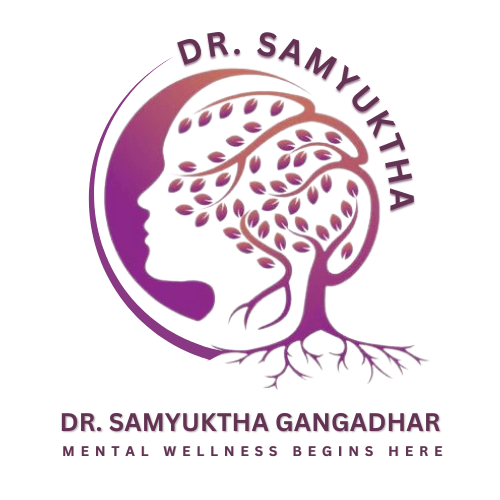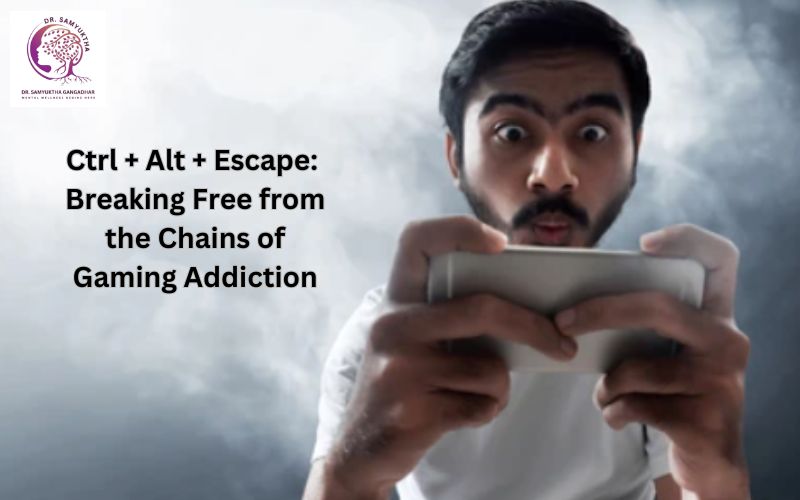In today’s digital age, online gaming has become a widespread and highly popular form of entertainment. For many, it’s a way to unwind, socialize, and engage in thrilling virtual worlds. However, when gaming begins to take up more time than healthy activities, it can lead to online gaming addiction, a serious mental health concern that can affect every aspect of one’s life.
At Pushpa Mind Care, under the guidance of Dr. Samyuktha Gangadhar M.D. (Psychiatry), we understand the complexities of this issue. In this blog post, we will explore the signs, risks, and consequences of online gaming addiction and provide actionable advice on how to regain control of your life. By the end of this post, you’ll not only understand the underlying causes of gaming addiction but also learn how to break free from its grip.
Understanding Online Gaming Addiction
Online gaming addiction is a compulsive behavior in which a person becomes overly involved in gaming to the point where it negatively impacts their personal, social, and professional life. This addiction is characterized by an inability to limit gaming time, neglect of responsibilities, and an overwhelming urge to play, even when it causes harm.
Statistics on Gaming Addiction
Research indicates that around 3-4% of gamers experience online gaming addiction. According to a study by the American Psychological Association, gaming addiction can be as serious as substance abuse, with individuals losing control over their gaming behavior and experiencing withdrawal symptoms when not gaming. The World Health Organization (WHO) has also recognized gaming disorder as a mental health condition, emphasizing the need for treatment and intervention.
Signs of Online Gaming Addiction

Identifying the signs of gaming addiction is the first crucial step in tackling the problem. Here are some common symptoms:
- Excessive Gaming Time: Spending more than 20 hours a week playing online games or neglecting daily responsibilities to make more time for gaming.
- Neglecting Social Life: Withdrawing from family, friends, and real-world activities to play games.
- Mood Swings: Experiencing irritability, anxiety, or depression when not playing.
- Decreased Performance in Work or Studies: Declining performance at work or in academics due to excessive gaming.
- Preoccupation with Gaming: Constantly thinking about gaming even when engaging in other activities.
- Lack of Control: Unable to cut back or quit playing despite the negative consequences.
If you notice these signs in yourself or a loved one, it may be time to take action and seek help.
The Impact of Gaming Addiction
The effects of online gaming addiction can be both psychological and physical, leading to long-term consequences if left unaddressed. Some of the major impacts include:
1. Mental Health Issues
Addicts often experience anxiety, depression, and mood disorders due to prolonged isolation and lack of engagement in real-world activities. The constant rush of dopamine from gaming can alter brain chemistry, making it difficult to experience pleasure from other activities.
2. Physical Health Problems
Sitting for long periods of time can lead to a sedentary lifestyle, causing obesity, back pain, and carpal tunnel syndrome. Sleep deprivation is another common issue, as gamers often stay up late, disrupting their circadian rhythm.
3. Relationship Strain
Excessive gaming can put a strain on relationships with loved ones, including family and friends. A person may prioritize gaming over spending quality time with loved ones, leading to conflict and emotional distress.
4. Poor Academic or Professional Performance
Addiction can also harm one’s professional or academic life, leading to missed deadlines, declining grades, and a loss of motivation in career pursuits.
How to Break Free from Online Gaming Addiction

Breaking free from gaming addiction requires a multi-faceted approach that combines self-awareness, time management, and professional help. Here are some actionable steps you can take:
1. Acknowledge the Problem
The first step in overcoming addiction is admitting there is a problem. Recognize that gaming has become a distraction from your personal, social, and professional life, and that you need to take control of the situation.
2. Set Boundaries and Limit Gaming Time
Establishing limits on how long you can play each day is crucial. Try using apps that monitor screen time or set a timer to remind yourself when it’s time to take a break. Gradually reduce your gaming hours to a healthy level.
3. Replace Gaming with Healthy Activities
Participate in hobbies or activities that enhance both your mental and physical health. Exercise, meditation, reading, and spending quality time with loved ones are all great alternatives. These activities help break the cycle of addiction and offer new ways to relax and feel rewarded.
4. Seek Professional Help
If you find it difficult to control your gaming habits on your own, it’s important to seek professional help. Dr. Samyuktha Gangadhar, a trusted psychiatrist at Pushpa Mind Care, specializes in treating behavioral addictions and can help you develop coping strategies tailored to your needs. Cognitive Behavioral Therapy (CBT) and counseling are effective treatments for addiction, helping you understand the root causes of your behavior and make long-lasting changes.
5. Join Support Groups
Support groups can be a helpful way to connect with others who are going through the same struggle. Sharing experiences and gaining support from peers can make the recovery process feel less isolating.
6. Maintain a Balanced Life
Make an effort to maintain harmony across all areas of your life. Set goals for work, school, socializing, and relaxation. Keeping a balanced schedule will help you avoid falling back into old habits and reduce the temptation to play excessively.
Expert Insights on Gaming Addiction
According to Dr. Samyuktha Gangadhar, “Online gaming addiction can have a significant impact on mental health. It’s essential for individuals to identify unhealthy patterns and work with mental health professionals to regain control.” Dr. Gangadhar suggests starting with small steps, such as gradually reducing screen time and replacing gaming with other fulfilling activities.
The Role of Family and Friends
The role of family and friends in supporting someone with gaming addiction is crucial. Offering a non-judgmental space, encouraging healthy activities, and seeking professional help together can make a big difference. Pushpa Mind Care encourages families to be part of the recovery process by providing educational resources and therapy options for loved ones.
Prevention: How to Protect Yourself from Gaming Addiction
Prevention is key to avoiding the onset of gaming addiction. Here are some tips to stay in control of your gaming habits:
- Set Limits Early: Establish limits on gaming before it becomes a problem.
- Encourage Socialization: Make time for offline interactions with family and friends.
- Use Parental Controls: For younger gamers, set parental controls to limit gaming time and monitor behavior.
- Stay Active: Ensure you engage in physical and social activities outside of gaming.
Conclusion
Online gaming addiction is a serious issue that affects many individuals globally. However, with the right support, strategies, and professional help, it is possible to break free from its grip. At Pushpa Mind Care, we offer expert guidance and treatment under Dr. Samyuktha Gangadhar M.D. (Psychiatry) to help those struggling with online gaming addiction.
If you or someone you know is dealing with gaming addiction, don’t hesitate to reach out for support. It’s time to Ctrl + Alt + Escape and reclaim control of your life.

